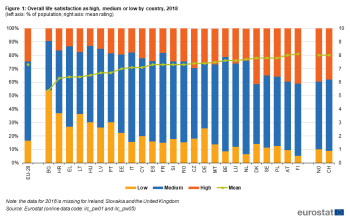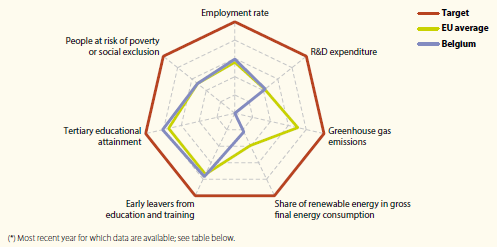Archive:Europe 2020 indicators - Belgium
This article is part of a set of statistical articles based on the Eurostat publication Smarter, greener, more inclusive? - Indicators to support the Europe 2020 strategy. It provides recent statistics on the situation in Belgium.
Main statistical findings
The employment rate in Belgium has remained stagnant at about 67 % since the onset of the economic crisis in 2008. Although still at distance from its national targets, Belgium performed slightly better than the EU average in terms of reducing early leaving from education and training rates and increasing tertiary education levels and R&D intensity. The 25 % gap to its poverty target reflects recent increases in poverty rates. Despite the rapid uptake of renewable energy, from 2.3 % of gross final energy consumption in 2005 to 4.1 % in 2011, Belgium still lagged far behind its target. Furthermore, stronger progress than in the other Member States is needed if Belgium is to fulfil its GHG emissions commitments, as in 2010 Belgium was the country with the largest distance to its national target.
- Data from July 2013. Most recent data: Further Eurostat information, Main tables.
- Data from July 2013. Most recent data: Further Eurostat information, Main tables.
Data sources and availability
http://epp.eurostat.ec.europa.eu/portal/page/portal/europe_2020_indicators/headline_indicators (write one or two sentences with link to dedicated section)
Context
Measures implemented to meet the national targets
Employment: introduction of various reforms including traineeships, individual guidance and others, tailored especially at young job seekers, women and low-skilled workers; employment activation measures for individuals with migrant background.
R&D expenditure: Adoption of an action plan for boosting economic growth through R&D; continued fiscal support policy for R&D; support of various projects and initiatives in priority sectors: ICT, life science, environment and sustainable development; implementation of measures aimed at simplifying the institutional landscape for innovation.
GHG emissions: Establishment of a financial framework for achieving Belgium’s GHG commitments through the creation of a Flemish Climate Fund; adoption of a Brussels’ code for air, climate and energy (COBRACE); measures aimed at reducing emissions from transport.
Renewable energies: Adoption of an action plan for promoting renewable energy sources including quotas for green electricity certificates, framework for
the development of an onshore wind energy, support for biomass and geothermal heat projects and others.
Energy efficiency: Achieving considerable reduction in energy consumption of buildings (residential,non-residential, private and public), including stricter energy consumption standards for new buildings, improved and more transparent energy certification, insulation standards and energy subsidies for existing buildings, information and awareness raising campaigns for energy savings.
Early school leaving: Launch of a new comprehensive strategy including action plans for preventing early school leaving as well as supporting students endangered of leaving compulsory education; measures related to class size in primary and secondary education; adoption of a participative approach with stakeholders to reduce repeat rates for children in early school years.
Tertiary education: Widening the participation in higher education especially for people from underrepresented groups; modernisation and reform of tertiary education; facilitating student mobility through provision of financial assistance, establishment of agreements with institutions, promotion of internships.
Poverty: Ensuring social protection without raising contributions on labour, reducing child poverty, active inclusion policy for groups furthest from the labour market, preventing inadequate housing and homelessness.
The European Commission's 2013 country-specific recommendations
Employment: Take further measures to reduce disincentives to work, enhancing interregional labour mobility and ensuring the inclusion in the labour market of individuals from migrant backgrounds.
GHG emissions: More concrete measures and a clear division of tasks between federal and regional authorities are needed to ensure that Belgium meets its targets, especially for transport and buildings.
Sustainable public finances: Adoption of additional measures and growth-enhancing structural reforms is needed in order to correct fiscal imbalances.
Other recommendations: Ensuring social security for the increasing elderly population through further pension reforms, employment support for older workers and improved efficiency of long-term care spending; reforming the wage setting system to restore competitiveness, improving competition in network industries and services; shifting away taxes from labour, simplifying the tax system and improving its efficiency.
Further Eurostat information
Publications
Main tables
Dedicated section
Methodology / Metadata
- Towards robust quality management for European Statistics - Communication from the Commission to the European Parliament and the Council COM(2011) 211 final
Other information
- Regulation 223/2009 of 11 March 2009 on European statistics
External links
See also
Notes
[[Category:<Subtheme category name(s)>|Europe 2020 indicators - Belgium]] [[Category:<Statistical article>|Europe 2020 indicators - Belgium]]


